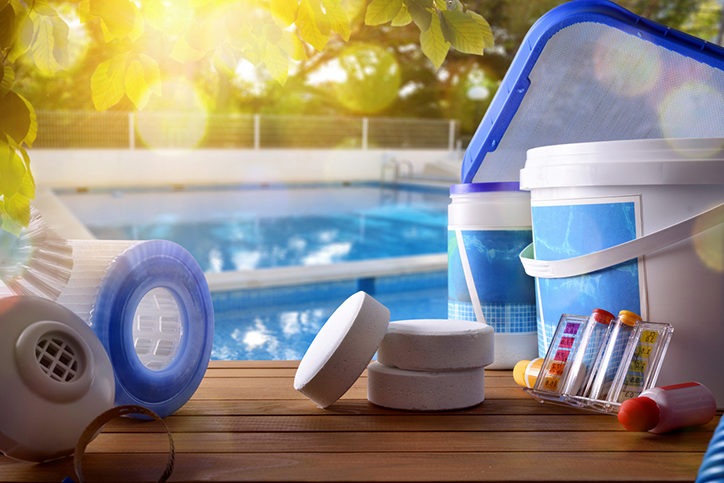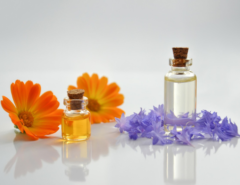Summer is a great time to get vitamin D from the sun while relaxing at the pool. Any pool owner will tell you that getting the pool ready for use, maintaining it, and closing it up for the off- season is no small task. It often requires multiple types of chemicals to keep the water clean, clear, and balanced. Types of chemicals used in pools can include chlorine, balancing chemicals, pool shock, algae control, salt, clarifier, and more. Let’s look more into some of these chemicals and how to safely use and store them.
General Safety
Pool chemicals are necessary to keep pools clean and safe. It is important to use pool chemicals safely so everyone can enjoy summer fun in the sun. Always read the entire label on the product before using it, especially the directions and warnings. Wear protective equipment such as gloves or goggles to avoid direct contact with the chemicals before they are diluted in the pool. Use caution when opening these products as they may have a strong odor and powders may “puff” out as containers are opened. Avoid mixing chemicals directly with one another, especially chlorine-containing products. Keep these stored up, away, and out of sight of children.
Chlorine
Chlorine for pools often comes as tablets or powder that is meant to dissolve in the water. It is also called pool shock. Once dissolved in the pool, it helps to keep the water clear and free from germs and algae.
Always follow the package directions. Add chlorine directly into the pool water to avoid explosive reactions that can occur when the amount of chlorine in a body of water is increased too quickly. Never pour water into a container of chlorine or try to dissolve the chlorine in a small container of water before adding it into the pool water – this can cause that explosive reaction.
Chlorine can be irritating, especially to the skin, eyes, and airway, and has the potential to cause trouble breathing or chemical burns. Use caution when opening the product as it may puff out of the container when opened. It is best to open the product outside in the open air rather than inside a shed or garage.
Do not mix chlorine products with any other products. When chlorine is mixed with acidic products or products containing ammonia, it can form a toxic gas that is irritating to the nose, throat, and lungs, and can cause trouble breathing.
Balancing Chemicals
Pool balancing products may have several different names or types, such as alkalinity increaser, pH raising or lowering products, calcium hardness increaser, or chlorine stabilizer. These products may be acidic or basic and work to keep the water of the pool neutral. There are tests to determine the chemical measurements that would then determine how much of what chemical you’d use. Be sure to follow the label directions for the proper amount of the products to add based on the test results and your pool size.
Other Products
In addition to pool balancing products and chlorine, other products such as non-chlorine pool shock and demineralizer may also be very irritating and cause chemical burns. The risk of burns or other injury is increased with more highly concentrated products and the longer someone is in contact with the product.
Saltwater pools require salt to be added to maintain the proper salt level. Salt is made of sodium and chloride, both of which are minerals found in our blood. When the amount of salt (more specifically, sodium) in our blood changes quickly it can be dangerous and may cause life-threatening symptoms, such as seizures.
If someone is having trouble breathing after being exposed to any pool chemical, call 911 right away and get fresh air. If someone is having irritation in their throat, eyes, or on their skin, contact the Maryland Poison Center at 1-800-222-1222.
Victoria Macdonald, PharmD
Clinical Toxicology Fellow





Leave a Reply